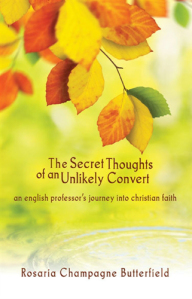The Secret Thoughts of an Unlikely Convert
by Rosaria Champagne Butterfield

Genre: Autobiography
Size: 128 pages. 5 sections in total. I read through it, transfixed, in one evening. I wish more books were this captivating.
What’s the big idea: Rosaria recounts how her identity as tenured feminist professor at Sycaruse University and lesbian community activist transformed into a covenant child of God, orthodox Christian and pastor’s wife. Along the way she touches on topics such as repentance/faith, homosexuality and identity, the Reformed Presbyterian (RPCNA) community, hospitality, worship principles, marriage, family, homeschooling, adoption and racial reconciliation.
Easy to read? Definitely. Started it one evening and couldn’t put it down. Rosaria — an English professor by training — writes in a very eloquent, poetic style that’s not afraid to pull punches. Her prose is first-rate, and her sentences are full of gems that I found myself frequently stopping to re-read what she just said.
What I appreciated? On reaching the last page, I was astounded by the incredibly life-transforming work of Christ.
Throughout the book, I was challenged on so many issues to reconsider how I think and speak about those in the LGBT community, the humiliating cost of following Christ, compassion and mercy ministry (and how secular/LGBT communities do this better!), sexual sin and gender politics and more. Rosaria has fantastic thoughts about the indispensable role of hospitality in proclaiming the gospel.
I was surprised to find in chapter 3 a fleshed-out stand for strict regulative principle in worship (e.g. singing only Psalms during the church service). Chapters 4 and 5 talked about the sacrificial life of being a mother to biological, adopted and foster children and the classical model of homeschooling. I didn’t agree with all her conclusions, but found each issue was argued passionately, logically and winsomely.
Who I’d recommend it to: While her background makes her uniquely qualified to wrestle and challenge Christians and non-Christians on their convictions on homosexuality and identity, don’t pigeonhole this book as simply a go-to for same-sex attraction/LGBT issues. As Rosaria points out herself:
We like to think that sin is contained by categories of logic or psychology. It’s not. So why do we assume that sexual sin has sexual or affectual origins? That is because we have too narrow a focus about sexuality’s purview. Sexuality isn’t about what we do in bed. Sexuality encompasses a whole range of needs, demands, and desires. Sexuality is more a symptom of our life’s condition than a cause, more a consequence than an origin.
So I think anyone remotely interested in hearing an intellectually and emotionally compelling case for the change the love and compassion of Christ can make — whatever your worldview, orientation or religious conviction — will benefit from reading what Rosaria has to say. You’ll enjoy an arresting autobiography that will certainly make you think.
Notable quotes: Plenty, but here are a few from my full list:
On “conversion”, and honesty about the cost of discipleship:
“… I share what happened in my private world through what Christians politely call conversion. This word — conversion — is simply too tame and too refined to capture the train wreck that I experienced in coming face-to-face with the Living God. I know of only one word to describe this time-released encounter: impact. Impact is, I believe, the space between the multiple car crash and the body count. I try, in the pages that follow, to relive the impact of God on my life.”
Conversion put me in a complicated and comprehensive chaos. I sometimes wonder, when I hear other Christians pray for the salvation of the “lost,” if they realize that this comprehensive chaos is the desired end of such prayers. Often, people asked me to describe the “lessons” that I learned from this experience. I can’t. It was too traumatic. Sometimes in crisis, we don’t really learn lessons. Sometimes the result is simpler and more profound: sometimes our character is simply transformed.
On the church, tribalism and interfacing with others:
“I believed then and I believe now that where everybody thinks the same nobody thinks very much.”
“Too often the church does not know how to interface with university culture because it comes to the table only ready to moralize and not dialogue. There is a core difference between sharing the gospel with the lost and imposing a specific moral standard on the unconverted. Like it or not, in the court of public opinion, feminists and not Bible-believing Christians have won the war of intellectual integrity.”
“Mercy ministry always comes down to this: you can help, but only Jesus can heal.”
On Christianity and homosexuality:
“A Methodist pastor and the Dean of the Chapel at Syracuse University believed that I did not have to give up everything to honor God. Indeed, he told me, since God made me a lesbian, I gave God honor by living an honorable lesbian life. He told me that I could have Jesus and my lesbian lover. This was a very appealing prospect. But I had been reading and rereading scripture, and there are no such marks of postmodern “both/and” in the Bible.”
“She said: “Rosaria, if people in my church really believed that gay people could be transformed by Christ, they wouldn’t talk about us or pray about us in the hateful way that they do.” Christian reader, is this what people say about you when they hear you talk and pray? Do your prayers rise no higher than your prejudice?”
Dealing with a case of racism with the truth of adoption:
One time, Kent was filling a pulpit at a small church in a small town. These places scare me, and for good reason. Knox was asleep on my shoulder and Mary was asleep in the car seat. A man walked up to me, not knowing that I was the preacher’s wife, and said: “So, is it chic for white women to adopt black kids these days?” I took a deep breath and stood up to meet his gaze. “Are you a Christian?” I asked him. “Yes, ma’am,” he replied. “Did God save you because it was chic?” We locked eyes until he dropped his head. He stammered something unintelligible and backed away slowly, seeming to understand that even when the bear does not look like the cubs, the trauma of having one’s head ripped off by a protective mama can be bloody business.
Verdict: Must read. I agree with Carl Trueman’s summary: “I cannot recommend this book highly enough. I do not agree with everything she says; but I did learn from everything she wrote. It deserves the widest possible readership.”
Go and grab a copy!
Other reviews and further reading:
My Train Wreck Conversion – CT article
Journey of Grace – World Mag
Engaging Gay Activists on Campus: A Primer – Intercollegiate Review



